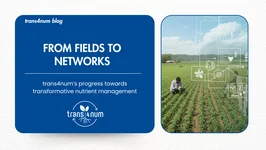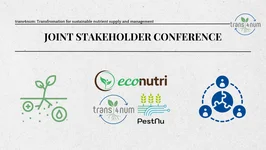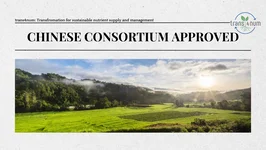| Communication team
As the trans4num project moves into its final year, the four European Nature-based Solution (NBS) sites, in Denmark, Hungary, the Netherlands, and the United Kingdom, are showing how science and practice can come together to make nutrient management more sustainable, circular, and climate-resilient.
Over the past two years, these sites have evolved from experimental plots into living laboratories that bring together farmers, advisors, researchers, industries, and policymakers. Each represents a different agricultural system, but together they tell a shared story of innovation, collaboration, and transformation.
Year 1 (2023-2024): Setting the foundations
The first phase of trans4num focused on establishing field trials, building partnerships, and testing early NBS innovations. By the end of 2024, all four European sites had implemented pilot activities designed to address local nutrient challenges.
Building a circular nutrient economy
In Denmark’s Limfjord catchment, farmers face some of the country’s strictest environmental regulations, requiring a reduction of 1,500 tonnes of nitrogen losses annually. The Danish team began by introducing perennial biomass rotations, grass and grass-clover crops that remain in the ground year-round, to reduce nitrate leaching, improve soil health, and provide feedstock for green biorefineries. Collaborations with Klimafonden Skive (KFS) and Aarhus University (AU) linked these farming innovations to broader nutrient-flow models and policy dialogues. Interviews and workshops with farmers, industries, and regulators helped identify both barriers and opportunities, including the potential of a “regulatory sandbox” to test flexible policy instruments.
DK NBS Site
Year 1 DK Insights
Combining crop innovation with ecosystem production
In Szigetköz, Hungary’s largest inland delta, the team established 20 hectares of comparative field trials to test a three-year rotation of durum wheat, sorghum, and soybean under NBS management versus conventional systems. Researchers used sensor-based soil monitoring, drone imagery, and carbon-emission analysis to track impacts on soil fertility and biodiversity. The first results were encouraging: while yields were comparable between NBS and conventional plots, CO₂ emissions were lower and soil structure improved where ploughing was skipped. Farmers participated in engagement events organised by SZE University and PKE, helping translate research into local practice.
HU NBS Site
Year 1 HU Insights
Exploring plant-based fertilisation
Exploring plant-based fertilisation
At the Dutch NBS sites in Kollumerwaard and Ebelsheerd, trans4num built upon the long-term Planty Organic experiment to test alternatives to animal and mineral fertilisers. The team from SPNA and Wageningen University explored cut-and-carry compost systems, cover crops, and alfalfa or grass pellets as plant-based nutrient sources. Soil sampling and microbial analyses indicated promising improvements in soil health, while field visits and webinars engaged farmers and advisors in evaluating results. Early challenges, notably the slower spring mineralisation of plant-based fertilisers, guided adjustments for the following year.
NL NBS Site
Year 1 NL Insights
Linking long-term experiments to new nutrient sources
At Rothamsted Research, two complementary platforms tested NBS innovations: The Large-Scale Rotation Experiment (LSRE) evaluated compost addition, reduced tillage, and crop diversification The North Wyke site trialled a novel phosphorus fertiliser (“Thallo”) derived from abattoir by-products. Despite a year of erratic weather, drought followed by flooding, early data showed that compost increased soil organic carbon and biological activity, and that Thallo performed comparably to conventional fertilisers. These early findings laid the groundwork for integrated nutrient-management modelling in Year 2.
UK NBS Site
Year 1 UK Insights
Year 2 (2024–2025): Linking science, practice, and transformation
By mid-2025, trans4num had shifted from individual field experiments to cross-site learning and transdisciplinary integration. The focus expanded from testing to understanding how these innovations can become part of wider agricultural systems.
From pilots to policy dialogues
In Denmark, the circular cropping systems began to show measurable effects:
- Pilot farms recorded reduced nitrogen leaching while maintaining biomass yields;
- Real-time nutrient-flow models, developed with Cordulus, visualised the environmental benefits under different scenarios;
- Farmers, regulators, and biorefinery representatives participated in co-creation events, helping refine both the Decision Support Tool (DST) and local policy proposals.
DK NBS Site
Year 2 DK Insights
Merging science and community engagement
In Szigetköz, Year 2 brought a broader integration of ecological and social dimensions. The field trials continued under wetter-than-average conditions, confirming the resilience of NBS crops and their soil-carbon benefits. Biodiversity monitoring identified 206 bird species, highlighting the region’s ecological richness. At the same time, PKE advanced the construction of mobile educational tools (“NBS Help”) for field demonstrations and outreach. Engagement events attracted local farmers, advisors, and students, turning the site into a hub for agroecological learning. The Hungarian case now provides a practical example of how NBS can support both environmental restoration and rural education.
HU NBS Site
Year 2 HU Insights
Refining plant-based systems and data tools
At the Dutch sites, Year 2 focus was on fine-tuning plant-based fertilisation and improving the synchrony between nutrient release and crop demand. Using the NDICEA nutrient-balance model, the team compared soil nitrogen dynamics across fertilisation strategies and seasons. Results confirmed that plant-based inputs improve soil structure and microbial diversity, but require better timing to match crop needs, especially in early spring. Workshops with farmers and advisors tested potential combinations of cover crops and plant pellets, while new data collection protocols ensured the trials could feed directly into the trans4num modelling framework.
NL NBS Site
Year 2 NL Insights
Connecting experiments with real-world applications
At Rothamsted and North Wyke, research advanced on several fronts. The LSRE produced detailed evidence on how compost application enhances soil carbon while balancing yield stability across diverse rotations. Meanwhile, Thallo fertiliser trials continued on arable and grassland crops, with the first complete data sets expected in 2025. Workshops and “Research Insight” days attracted farmers, advisors, and journalists, reflecting growing curiosity about compost use and circular fertiliser alternatives.
UK NBS Site
Year 2 UK Insights
What comes next (2025–2026): From research to impact
Entering its final year, trans4num is moving from experimentation to integration, testing, and impact delivery. Each NBS site will continue fieldwork while connecting more closely with national and EU-level policy discussions.
Across all sites, several priorities define the coming year:
- Testing the Decision Support Tool (DST) with at least 15 farmers and 15 stakeholders per region, allowing local data and user feedback to shape the final version.
- Refining nutrient-budget methodologies: Cross-site modelling will connect farm-level data with regional and European nutrient-flow analyses, identifying the most effective NBS combinations for reducing nitrogen and phosphorus losses.
- Strengthening stakeholder engagement and capacity building: Each site will host new co-creation workshops, demonstrations, and hackathons.
A growing picture of transformation
From its first year of field implementation to its second year of integration, trans4num has progressed from testing nature-based innovations to mapping transformation pathways, showing how circular and nutrient-smart farming can become reality.
Each site tells a unique story:
- Denmark is aligning farming innovation with policy change,
- Hungary is merging science with education and community participation,
- The Netherlands is proving that plant-based fertilisation can sustain productivity, and
- The UK is demonstrating how waste-derived fertilisers and compost can underpin a circular nutrient economy.
As trans4num enters its final year, its mission is clear: to turn research into action, and action into transformation, paving the way for nutrient-smart, climate-resilient food systems across Europe and beyond.



